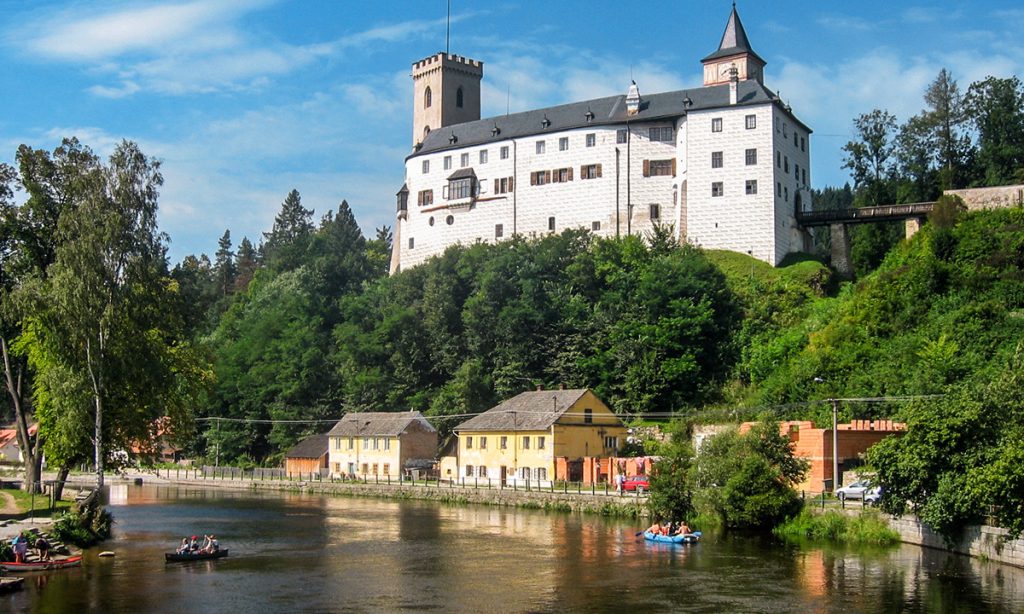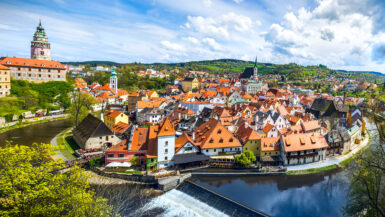People who visit Český Krumlov often hear about Rožmberk family. Either their guide tells them or they see a red rose – a symbol of the family. Non-Czech sources often use German version of this name – Rosenberg. Which is actually original version too. And they may be confused. Sometimes I get questions like: “Were Rosenbergs Jewish?” Or simply: “Why did they have a German name?”. So here I will try to explain origins of the name Rožmberk.
The very first written mention of this name is in a royal document of the king Václav I. He mentions certain “Woko de Rosenberch”. Woko de Rosenberch is known in Czech as Vok I. z Rožmberka, or in English, Vok First from Rožmberk.
Vok was a member of the powerful Vítkovci family (read about them here). This family, which symbol was a rose, split in the end of 12th century into five branches. Every branch received a symbol of rose again, this time in a different color. These colors were green, golden, red, white (or silver) and black (or blue). Founder of the red rose branch was Vítek III.
Latin as an official language in Bohemia
Bohemian kingdom was a country of Czech people. Czech language was a Slavic language and everybody was speaking Czech. However, for official purposes, a Latin was used.

A Latin was the official language of the aristocracy and the church. All royal, official or church documents were written in Latin. Czech names were often translated into quasi Latin version and if no Latin word could be used, a German was used. They often combined Latin and German. Why German?
Bohemia was a Christian country but until 1344 we did not have our own archbishop. Our church was subordinated to a powerful archbishopric in German Mainz. Therefore not just Latin, but even German was used. Moreover, since 9th century all Czech dukes and kings married ladies outside of Bohemia. Very often ladies from German lands. Germans themselves were settling the Bohemian frontier since the end of 12th century. And the last but not least, German speakers were our direct (and strong) neigbours we had to deal with on regular basis.
Origins of the name Rožmberk
So we are almost there. Latin and German languages were widely used. Name of castles typically ended with ending “stein” or “berg”. Stein for castles built on rocks, berg for castles built on hills. Rožmberk is originally a castle built in the end of first half of the 13th century. Known as Rosenberg, or Rosenberch. And name of this castle was used by Vok I., his founder.

Vok, or Wok (Woko), was a different version for a Czech word “vlk”, which is Wolf. Vok as a Czech version. Wok with “w” as some Latinized or Germanized version of it.
So Vok simply did what was typical in those times. Instead of using Czech that would be difficult to understand and pronounce to our powerful German speaking neigbours, he used mix of Latin and German. His castle Rosenberg, or Rosenberch, expressed his affiliation to a powerful Czech family with a rose as a symbol. The ending “berg” simply described that his castle is built on a hill. Rosen = Rose, Berg = Hill. For Czech use this name was Czechized into “Rožmberk”.
And the name of his castle was used, as it was typical, as his own name. Therefore Woko de Rosenberch. Woko stands for Vok. De is latin prefix for from. And Rosenberch as his castle standing on the hill of roses. But again. This name was used for official purposes. In Czech he was simply Vok z Rožmberka. And that is the origins of the name Rožmberk which was then used by all of his offsprings.
Do you want to know more? Join our tour.



Leave a reply